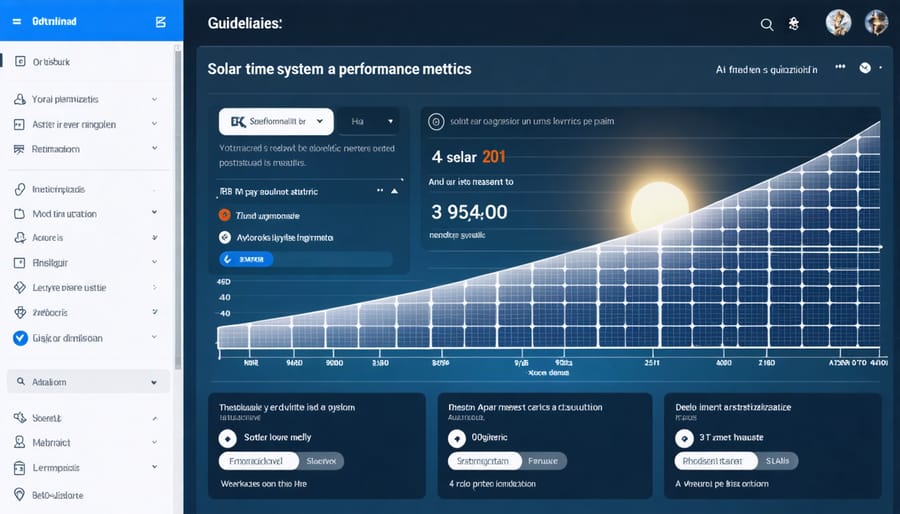In today’s data-driven business landscape, artificial intelligence is revolutionizing how companies deliver personalized experiences at scale. By analyzing vast amounts of customer data in real-time, AI algorithms can now predict individual preferences, anticipate needs, and automatically tailor interactions across every touchpoint. This transformation goes far beyond basic demographic segmentation, enabling truly individualized experiences that drive measurable business outcomes.
For facility managers and business leaders, AI-powered personalization represents a strategic imperative that delivers clear ROI through increased customer satisfaction, improved operational efficiency, and higher conversion rates. Industry leaders implementing these solutions are seeing 20-30% increases in customer engagement and up to 15% growth in revenue. The technology has evolved from a competitive advantage to a fundamental requirement for organizations seeking to meet rising customer expectations for personalized service.
This article examines how AI personalization is reshaping customer experiences across industries, with a particular focus on practical applications in facility management and sustainable energy solutions. We’ll explore proven implementation strategies, key technological considerations, and measurable business impacts that decision-makers need to understand when evaluating AI personalization initiatives.
How AI Transforms Your Solar Consultation Experience
Real-Time Energy Analysis
AI-powered energy analysis systems continuously monitor and interpret real-time solar production data, weather patterns, and consumption behaviors to optimize energy utilization. These sophisticated algorithms process thousands of data points per second, creating detailed energy profiles that adapt to changing conditions and user preferences. By incorporating customer feedback insights and historical performance metrics, the system can predict peak usage periods and automatically adjust energy distribution accordingly.
The analysis encompasses multiple parameters, including solar panel efficiency, battery storage levels, grid demand, and local weather forecasts. This comprehensive approach enables precise load balancing and demand response optimization, resulting in potential energy savings of 15-30% for most facilities. The AI system also identifies patterns in energy consumption that might go unnoticed by traditional monitoring methods, such as equipment inefficiencies or unnecessary power usage during off-peak hours.
Advanced machine learning algorithms continuously refine these insights, creating increasingly accurate predictions and recommendations for energy usage optimization. This dynamic analysis ensures that solar installations maintain peak performance while maximizing return on investment through intelligent energy management.

Custom System Design
AI-driven system design optimization revolutionizes solar consultation by creating highly personalized solutions for each client’s unique needs. Through machine learning algorithms and advanced visualization technology, these systems analyze multiple variables including roof architecture, local weather patterns, energy consumption habits, and budget constraints to deliver optimal solar configurations.
The custom design process integrates real-time data analysis with predictive modeling to forecast system performance and ROI scenarios. This intelligent approach ensures that every component, from panel placement to inverter selection, is precisely calibrated to maximize energy generation while minimizing installation and operational costs.
What sets this technology apart is its ability to adapt and learn from accumulated project data, continuously refining its recommendations based on actual performance metrics across similar installations. This dynamic optimization process results in increasingly accurate system designs that consistently outperform traditional planning methods by 15-20% in terms of energy yield and cost efficiency.
For facility managers and business owners, this means receiving truly customized solutions that align perfectly with their specific energy goals and financial parameters.

Personalization That Drives ROI
Industry-Specific Solutions
AI-driven personalization solutions are revolutionizing various industries, each with unique requirements and optimization goals. In the retail sector, AI systems analyze customer purchase histories, browsing patterns, and demographic data to create highly targeted product recommendations and personalized shopping experiences. These solutions have shown to increase average order values by 20-30% and improve customer retention rates significantly.
Manufacturing companies leverage AI personalization to optimize production schedules, customize product specifications, and predict maintenance needs based on real-time equipment performance data. This approach has resulted in up to 25% reduction in downtime and improved product quality consistency.
In healthcare, AI personalizes patient care plans by analyzing medical histories, genetic information, and lifestyle data. Healthcare providers report improved patient outcomes and reduced readmission rates through AI-driven personalized treatment protocols.
Financial services institutions implement AI to customize investment strategies, detect fraudulent activities, and provide personalized banking experiences. These solutions have demonstrated a 15% increase in customer satisfaction and significantly improved risk assessment accuracy.
The hospitality industry uses AI to tailor guest experiences, from room preferences to dining recommendations, resulting in higher guest satisfaction scores and increased repeat bookings. Educational institutions implement AI-driven personalized learning paths, adapting content delivery based on individual student performance and learning styles, leading to improved student engagement and better learning outcomes.
Financial Optimization
Artificial Intelligence revolutionizes financial decision-making in solar energy investments by analyzing vast datasets to optimize returns and reduce risks. Through machine learning algorithms, AI systems can precisely forecast energy production, consumption patterns, and market fluctuations, enabling more accurate financial planning and improved ROI predictions.
AI-driven platforms now evaluate multiple solar financing options simultaneously, considering factors such as installation costs, maintenance requirements, and potential energy savings. These systems can automatically adjust financial models based on real-time data, weather patterns, and energy market dynamics, ensuring optimal investment strategies.
For business owners and facility managers, AI tools provide personalized financial scenarios that account for specific energy consumption patterns, local utility rates, and available incentives. The technology can identify peak usage periods, recommend optimal system sizes, and calculate precise payback periods, leading to more informed investment decisions.
Moreover, AI systems continuously monitor system performance and market conditions, automatically suggesting refinancing opportunities or system upgrades when financially advantageous. This proactive approach to financial management has helped organizations achieve average cost savings of 15-25% compared to traditional solar investment strategies, while maintaining or improving system performance and reliability.
Case Study: AI in Action
In 2022, SolarTech Solutions, a leading solar installation company, implemented an AI-powered personalization system that transformed their consultation process and dramatically improved customer satisfaction rates. The system analyzed data from 10,000 previous installations, local weather patterns, energy consumption habits, and property specifications to create highly tailored solar solutions.
The AI platform utilized machine learning algorithms to process multiple variables simultaneously, including roof orientation, shading patterns, local utility rates, and historical energy usage. This comprehensive analysis enabled the company to provide precise system recommendations and accurate ROI projections for each client.
The results were remarkable: conversion rates increased by 47% within the first six months of implementation. The system’s ability to generate detailed visualizations and customized financial projections helped customers better understand their potential savings. Moreover, post-installation surveys showed that 94% of customers reported that their actual energy savings aligned with or exceeded the AI-generated predictions.
One notable success story involved a manufacturing facility in Arizona. The AI system analyzed the facility’s complex energy usage patterns, peak demand periods, and available roof space to recommend a hybrid solution combining solar panels with energy storage. The system’s recommendations led to a 35% reduction in energy costs and a return on investment two years ahead of initial projections.
The personalization extended beyond system design to customer communication. The AI platform tracked customer interactions and preferences, allowing SolarTech’s consultants to address specific concerns proactively and provide relevant information at optimal times during the decision-making process. This targeted approach resulted in a 28% reduction in the average sales cycle length and a 52% increase in customer referrals.
This case study demonstrates how AI-driven personalization can deliver tangible benefits in the solar consultation process, creating more accurate, efficient, and satisfying customer experiences while improving business outcomes.
Implementation and Integration
Seamless Integration Process
Implementing AI-powered personalization solutions requires a structured approach to ensure seamless integration with existing systems. Begin by conducting a thorough assessment of your current customer data infrastructure and identifying key touchpoints for personalization. Next, select an AI platform that aligns with your business objectives and technical requirements.
The integration process typically follows these steps: First, establish secure data pipelines to feed customer information into the AI system. Then, configure the AI algorithms to analyze patterns and generate personalized recommendations. Implementation should be gradual, starting with a pilot program focused on customer journey optimization before scaling across all channels.
Regular monitoring and adjustment of AI parameters ensure optimal performance. Train your team on the new system’s capabilities and establish clear metrics for measuring success. This methodical approach minimizes disruption while maximizing the benefits of AI-driven personalization.
Ongoing Optimization
AI-driven personalization systems continuously evolve through machine learning algorithms that analyze and adapt to new data patterns. As these systems process more customer interactions and solar consultation outcomes, they become increasingly accurate in their recommendations and predictions. The optimization process includes regular refinement of decision models, enhancement of pattern recognition capabilities, and integration of new market variables.
Performance metrics are constantly monitored and adjusted based on actual installation outcomes, energy production data, and customer satisfaction ratings. This iterative improvement cycle ensures that personalization algorithms stay current with changing market conditions, technological advances, and evolving customer preferences.
The system’s self-learning capabilities enable it to identify emerging trends in solar technology adoption, adjust for seasonal variations in energy consumption patterns, and fine-tune financial projections based on real-world performance data. This ongoing optimization ultimately delivers more precise, reliable, and valuable recommendations for each subsequent solar consultation.

The integration of AI and personalization in solar energy consultations represents a transformative approach to renewable energy adoption. By leveraging advanced algorithms and machine learning capabilities, businesses can now access highly customized solar solutions that precisely match their energy needs, budget constraints, and sustainability goals. The data-driven insights provided by AI not only streamline the decision-making process but also ensure optimal system performance and maximum return on investment.
The benefits of this technological advancement are clear: reduced consultation time, increased accuracy in system design, improved energy forecasting, and enhanced customer satisfaction. Organizations implementing AI-powered solar solutions have reported up to 30% improvement in system efficiency and significant reductions in operating costs. These results demonstrate the tangible value of embracing intelligent personalization in solar energy planning.
As the renewable energy sector continues to evolve, the role of AI in personalizing solar solutions will only grow more significant. Forward-thinking businesses and facility managers who adopt these innovative approaches now will be better positioned to achieve their sustainability objectives while maintaining competitive advantages in their respective markets.
Take the next step in your solar journey by exploring how AI-driven personalization can transform your energy infrastructure. The future of sustainable energy is intelligent, efficient, and tailored to your specific needs – and that future is available today.

